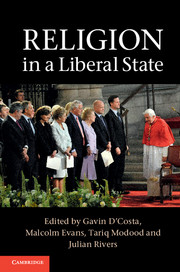Book contents
- Frontmatter
- Contents
- List of contributors
- Acknowledgements
- Introduction
- 1 Religion in a liberal state
- 2 The European Court of Human Rights and religious neutrality
- 3 Religion and sexual orientation: conflict or cohesion?
- 4 Liberal religion and illiberal secularism
- 5 Moderate secularism in liberal societies?
- 6 Excluded, included or foundational?
- 7 Justificatory secularism
- 8 What lacks is feeling: mediating reason and religion today
- 9 Arguing out of bounds: Christian eloquence and the end of Johannine liberalism
- Index
- References
4 - Liberal religion and illiberal secularism
Published online by Cambridge University Press: 05 June 2014
- Frontmatter
- Contents
- List of contributors
- Acknowledgements
- Introduction
- 1 Religion in a liberal state
- 2 The European Court of Human Rights and religious neutrality
- 3 Religion and sexual orientation: conflict or cohesion?
- 4 Liberal religion and illiberal secularism
- 5 Moderate secularism in liberal societies?
- 6 Excluded, included or foundational?
- 7 Justificatory secularism
- 8 What lacks is feeling: mediating reason and religion today
- 9 Arguing out of bounds: Christian eloquence and the end of Johannine liberalism
- Index
- References
Summary
You are at liberty to seek your salvation as you understand it, provided you do nothing to change the social order.
Attributed to Josef GoebbelsThe way in which recent conferences about religion and politics have been framed reveals hidden assumptions: ‘Religion Confronts the Secular State’, ‘Is Religion Compatible with Liberal Democracy?’, ‘Post-Secular Conditions: Challenges to Citizenship, Law, and Democracy’. Such titles lend support to a widespread view that secular states are the norm, and that they are being challenged by a recent ‘resurgence’ of (illiberal) religion, a development which threatens to shift religion from the private to the public sphere, and in doing so raises urgent new questions about whether liberal-democratic states and societies can or should accommodate the unexpected intruder. This chapter questions every one of these assumptions: that religion was ever separate from the modern state, politics and public life; that religion and liberalism are inevitably at odds with each other; and that secularism has a more constitutive relation with liberalism than religion. For the sake of brevity, examples are taken from the British situation, but the argument applies more widely.
Let me begin by sketching what I mean by liberalism. First, I mean something wider than ‘liberalism’ as it appears in those political theory textbooks where it is presented as a political ideology alongside conservatism, socialism, Marxism and so on. This is a bloodless abstraction of liberalism: detached from history, institutional embodiment, compelling symbolic forms and social life.
- Type
- Chapter
- Information
- Religion in a Liberal State , pp. 93 - 116Publisher: Cambridge University PressPrint publication year: 2013
References
- 12
- Cited by



